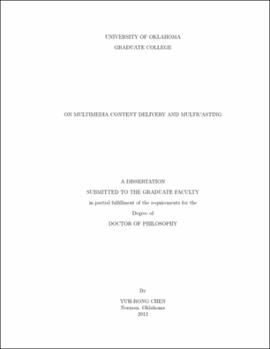| dc.contributor.advisor | Dhall, Sudarshan K||Radhakrishnan, Sridhar | |
| dc.creator | Chen, Yuh-Rong | |
| dc.date.accessioned | 2019-06-03T20:35:53Z | |
| dc.date.available | 2019-06-03T20:35:53Z | |
| dc.date.issued | 2012 | |
| dc.identifier | 99326187502042 | |
| dc.identifier.uri | https://hdl.handle.net/11244/320233 | |
| dc.description.abstract | Multimedia content now contribute to a huge amount of the Internet traffic due to the popularity and availability of anytime anywhere Internet connection. Unlike the circuit-switched telephone network - in which necessary resources are reserved for communication between two parties at the time the connection is established, a packet-switched network, like the Internet, only guarantees the reachability when the connection between two parties is established. In other words, the end-to-end delay and available bandwidth between two hosts depend on the amount of traffic on the network. The communication paths between the participating hosts are also determined by the routing policies and hence are not under control of the participating hosts. Hence how to improve the performance of delivering multimedia content on the Internet has become an interesting research topic. | |
| dc.description.abstract | In this dissertation, we consider the problem of delivering multimedia contents using multicast wherein a group of participants are participating in the same com- munication session. We assume the networks are flexible such that the end hosts can specify the communication paths. A few examples of this type of networks are overlay networks and IPv6 network with source routing support. This problem is addressed from both routing and network traffic perspectives. | |
| dc.description.abstract | First, we assume a two-layer approach which includes a well-provisioned service overlay network and the regular Internet. The participants in the multimedia group communication can take the advantage of the service overlay network by connecting to the nodes in the service overlay network through the Internet. We consider two major assignment problems - Server and Client Assignment Problem (SCAP, Client- Server model) and Client Assignment Problem (CAP, Peer-to-Peer model) as well as several variants of these problems. These problems are NP-hard and we have developed polynomial-time heuristic algorithms to assign the participants to appropriate service nodes such that some real-time constraint(s) are satisfied and the number of service nodes involved are minimal. Integer programming (IP) models for solving these problems are also developed for performance evaluation purpose. Empirical results show that the solution quality of the proposed algorithms compares favorably with the optimal ones obtained from the execution of IP models, while keeping the execution times significantly low. | |
| dc.description.abstract | We have also considered the Multi-stream Multi-source Multicast Routing Prob- lem ( MMMRP). Given a network and a set of multicast sessions, each with one or more sources and multiple destinations. The goal of MMMRP is to determine mul- tiple multicast tree for these multicast sessions on the given network in such a way that the overall residual bandwidth on the links that are shared among the trees is maximized. We prove that MMMRP is NP-hard and apart from providing an IP formulation, we have also provided a heuristic algorithm MMForests which runs in polynomial-time. We compared and contrasted the performance of MMMRP with known algorithms for the multicast tree packing problem. Our exhaustive empirical evaluations show that our heuristic has a very low execution-time while achieving the optimal residual bandwidth. In addition, our heuristic is very scalable as it is able to produce results for networks with thousands of nodes, unlike the other ones which are based on Steiner tree heuristics. | |
| dc.format.extent | 129 pages | |
| dc.format.medium | application.pdf | |
| dc.language | en_US | |
| dc.relation.requires | Adobe Acrobat Reader | |
| dc.subject | Multicasting (Computer networks) | |
| dc.subject | Multimedia communications | |
| dc.subject | Internet | |
| dc.subject | Webcasting | |
| dc.title | ON MULTIMEDIA CONTENT DELIVERY AND MULTICASTING | |
| dc.type | text | |
| dc.type | document | |
| dc.thesis.degree | Ph.D. | |
| ou.group | College of Engineering::School of Computer Science | |
